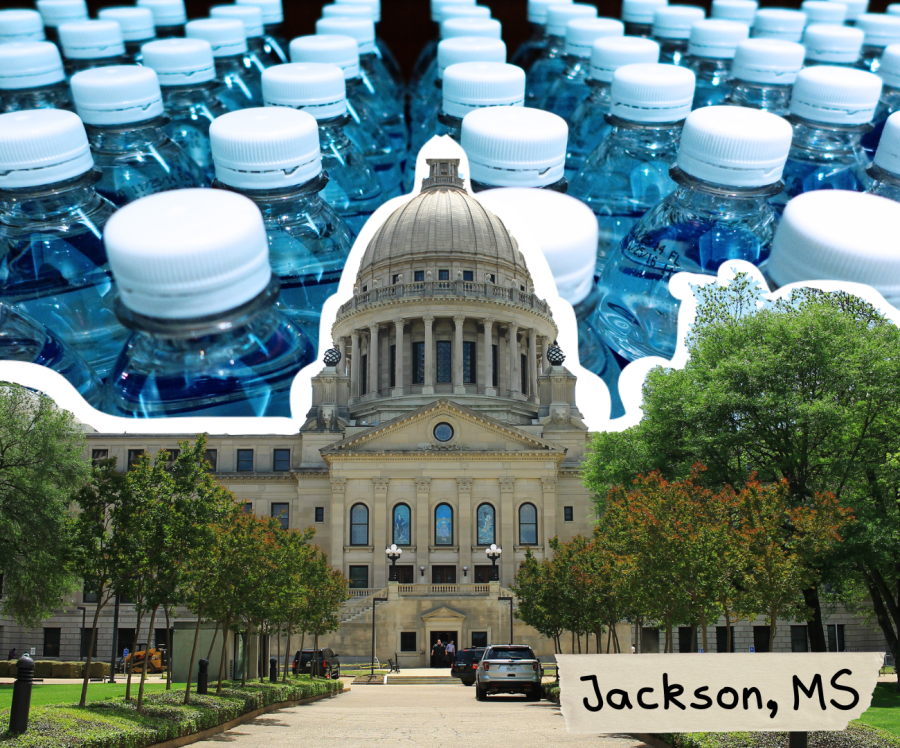Echols: Jackson’s water crisis paints a bigger picture of long-standing systemic environmental racism
Recently, Mississippi’s capital suffered from a lack of clean water as a result of environmental racism.
October 17, 2022
Citizens showering at YMCAs, tubs filling with odorous brown water and residents walking upward of 3 miles a day to provide clean water might seem like a scene out of an apocalypse, but this was the recent reality for many Mississippians living in the Jackson area.
The struggles of Jackson’s water system have been apparent for years. As recent as 2021, the city was without water and power for a month after a snowstorm. One year prior, the water system failed an Environmental Protection Agency inspection, and the EPA said the water system “presented an imminent and substantial endangerment to the health of persons served by the system.”
Though just recently, torrential rains and the flooding of the Pearl River left Jackson with unsafe water, low water pressure and sewage floating in the streets, leaving the city’s population of almost 150,000 without water.
These issues, however, were a long time in the making. The cause? Systemic racism.
Following the integration of schools in the 1960s, white people and businesses fled Jackson to avoid desegregation. As a result, the white population fell from 52% to 43% through the 1980s, and another 54,485 left the city from 1990 to 2010. Now, the population is 83% Black.
This white flight also meant the flight of white tax dollars. Considering the income gap and poverty rate among African American Jacksonians, the migration of white people caused the city’s tax base to be reduced, leaving its citizens with far less money for essential resources, including money to fix its failing water system.
Recently, there was much debate between the city’s Democratic leaders and the state’s Republican leaders over who holds the responsibility to fix Jackson’s aging infrastructure. In response to the 2021 crisis due to a snowstorm, Lt. Gov. Delbert Hosemann said, “the prime mover needs to be the city itself.”
Mayor Chokwe Lumumba reported the city has been supporting itself for the past few years and called out for any assistance available. However, when comparing Jackson’s 2021-2022 budget of $400 million to the $2 billion bill to fix its water and sewer system problem, it is unrealistic to assume Jackson can foot that bill alone. The city’s shrinking population and economic decline over the past decades don’t put it in the position to address the issue alone, and it shouldn’t have to.
Even though Jackson is Mississippi’s capital and the largest city in the state, the issue is viewed as a city-specific problem instead of a Mississippi problem. One of the main conclusions I can come to is white Mississippi lawmakers don’t see their Mississippi in Jackson because it is majority Black.
The Jackson water crisis and the state’s response are not anomalies. It is a part of a broader conversation about the lack of prioritization of Black communities having the necessary infrastructure and resources for success and sustainability. The recent crisis echoes the struggles for clean water in Flint, Michigan, a city with a Black population of 54%. Flint, too, struggled with aging pipes, lead contamination in the water supply and a Legionnaires’ disease outbreak. New Orleans, Louisiana, is similar in struggles, with a 59.2% Black population. Unfair pollutants from Cancer Alley; aging sewer, water and drainage systems; and a lack of economic aid and recovery efforts after Hurricane Katrina led the Black New Orleans community to plead for assistance with little to no avail. A similar story can be told about Jackson.
In a statement regarding an infrastructure bill following Jackson’s 2021 water crisis, President Joe Biden said, “Never again can we allow what happened in Flint, Michigan, and Jackson, Mississippi.”
I hope this is true, but in a state used to empty promises, I know crises like these will continue to happen without a collective effort to prioritize Black communities.
We, as a nation and as a state, must overcome the legacy of systemic and environmental racism — something legislation on its own can’t fix. Situations like Flint, New Orleans and Jackson weren’t inevitable. Suffering doesn’t have to be a key tenant in the Black community — suffering’s continuity results from choices made by unfair governance and the systems built against them.











Raeed Kabir • Oct 21, 2022 at 5:50 pm
This is well-written and insightful! Great job, Madison.